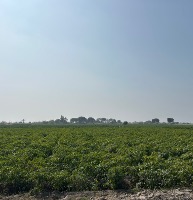Pakistan is the 8th most vulnerable country to climate change globally, with hazards such as extreme heat and flooding projected to cause ~4.5% losses to real GDP by 2050. .
Despite these risks, Pakistan faces a significant adaptation and resilience financing gap, at ~25x less than annual requirements, resulting in a £10B annual climate finance gap.
Sindh is particularly at-risk, as its cost of climate inaction (COI) is projected to reach £202B, with £156B in agricultural losses by 2050. However, Sindh also presents a key opportunity to mobilise climate investment, given its relative economic strength and institutional readiness. For instance, its strong Private-Public Partnership (PPP) unit has mobilised climate projects e.g., the Delta Blue Carbon Project.
Projected climate cost of inaction (COI) by 2050
Economic
£156B
Total cost of climate inaction (COI) losses in agriculture
Social
38.5M
People at risk from climate hazards
Women
8M
Rural Sindh women at risk (75% of rural Sindh’s total women population)
Growth Gateway / CIFAK partnered with the Government of Sindh to develop a robust pipeline of high-potential agricultural adaptation and resilience projects. This intervention aims to crowd in more private capital through a blended approach to strengthen adaptation and resilience in Sindh’s agricultural sector and support the delivery of Pakistan’s National Adaptation Plan.
Support Provided
Developed a portfolio of 10 adaptation and resilience solutions
First, a portfolio of 10 high-impact evidence-backed adaptation and resilience solutions was developed through combining climate cost of inaction modelling and extensive stakeholder engagement:
- Developed a longlist of ~30 solutions from ~60 priority actions tied to 2 climate impact drivers identified in Phase 1 i.e., Extreme Heat and Drought.
- Refined the longlist into a portfolio of 10 solutions via detailed impact-feasibility analyses, to maximise coverage across rice, dairy and beef value chains.
- Assigned funder archetypes to each project and recommended investment mechanisms.
Developed business cases for adaptation and resilience portfolio
Next, business cases for the adaptation and resilience portfolio solutions focusing on rice, and dairy and beef, were developed:
- Ran detailed analyses on associated cost of inaction avoided, and further adaptation and resilience benefits for each portfolio solution.
- Conducted a high-level full project costing and returns potential analyses (both commercial returns and state returns for “public good’ projects).
- Laid the foundation for building detailed investor memoranda for 2-4 commercial portfolio solutions.
Created investor engagement plan for portfolio solutions
Finally, a high-level investor engagement plan with a shortlist of ~30 investors was developed to support future investment mobilisation:
- Conducted 20+ interviews with multiple public, private, and development investors to gauge portfolio interest.
- Formulated barriers to scaling A&R financing and corresponding mitigation strategies developed.
- The next step will be to run further investor engagement, and progress projects to advanced commercial discussions e.g., MoUs.
4 projects were prioritised for investment mobilisation, with multiple stakeholders in Sindh citing the intervention’s usefulness in accelerating Sindh’s climate action efforts.
Impact Achieved
3% – 72% COI savings
Identified shortlist portfolio has the potential to save £5M – £112M in COI losses by 2050

£800M+ investment pipeline
£580M in rice pipeline and £230M in livestock (dairy and beef) pipeline

45+ stakeholders engaged
with significant interest shown from Government of Sindh and multiple private and public investors

To find out more about our impact, follow Growth Gateway on Linkedin or contact us
